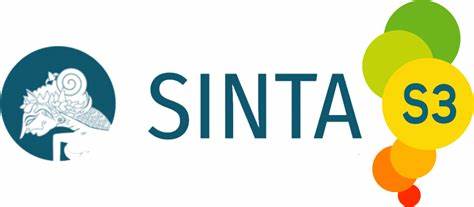TEACHING INDONESIAN CONCEPTS OF CULTURE THROUGH PAMALI
Keywords:
Culture, Cultural Conceptualization, Language, Pamali, TeachingAbstract
Pamali teaches the young generations of Indonesia to behave and act decently according to where they live. This is a strong term that brings fear to Indonesians because it contains prohibitions and most often causes that cannot be logically accepted. This research aims to show international readers how Indonesians teach the next generations through pamali (forbidden acts) found in an Indonesian comic. In this research, cultural conceptualization by Sharifian which is supported by Sibarani in his anthropolinguistic theory was used. The research is conducted using the descriptive–qualitative method. The data on pamali utterances are taken from an Indonesian comic book. It is because there is a very limited written source for pamali. The research uses the categorization of the cultural concepts seen in the dictions used. This study aims to find the concept of Indonesian culture. The results revealed that the use of many kinds of word classes that can be interpreted to show the concept of life of Indonesians. The concept teaches us about the people of Indonesia, the food, the daily activities, the sacred symbols, as well as the environment of Indonesia.
References
Andarab, M. S., & Mahmoudi, A. (2015). Cultural Conceptualization and Cross-Cultural Misunderstanding in Iranian English. International Journal of Language and Linguistics, 3(6), 353. https://doi.org/10.11648/j.ijll.20150306.16
Ani Rostiyati, Ria Intani Tresnasih, Nina Merlina, Sukari, T.M. Marwanti, Adeng, Heru Erwanto, & Lasmiyati. (2023). Pamali as a Social Bond of Kuta Traditional Village Communities. Journal of Hunan University Natural Sciences, 50(5), 224–231. https://doi.org/10.55463/issn.1674-2974.50.5.21
Cambridge Online Dictionary. (n.d.). Retrieved December 4, 2023, from https://dictionary.cambridge.org/dictionary/english/tradition
Duranti, A. (1997). Linguistic Anthropology (S. R. Anderson, J. Bresnan, B. Comrie, W. Dressler, C. Ewen, R. Huddleston, R. Lass, D. Lightfoot, J. Lyons, P. H. Matthews, R. Posner, S. Romaine, N. V. Smith, & N. Vincent, Eds.). Cambridge University Press.
Haswiyanti Harpriyanti, & Ida Komalasari. (2018). Makna Dan Nilai Pendidikan Pamali Dalam Masyarakat Banjar Di Desa Barikin Kabupaten Hulu Sungai Tengah. Jurnal Bahasa, Sastra, Dan Pengajarannya, Vol. 3, 242–252.
Ilić, M. B. (2004). Language And Culture Studies-Wonderland Through The Linguistic Looking Glass. Facta Universitatis Series: Linguistics and Literature, 3(1), 1–15.
KBBI VI Daring. (2023). https://kbbi.kemdikbud.go.id/entri/pemali
Lévi-Strauss, C. (2001). Myth and Meaning.
Pecandupagi, N. (2009). Pamali: Segerombolan Komik Tentang Mitos dan Pantangan. PT Gramedia Pustaka Utama.
Sadat, A., & Yusuf, M. (2020). Pamali Culture Of Polewali Community In West Sulawesi And Appreciation Of Islamic Jurisprudence. El-Harakah (TERAKREDITASI), 22(2), 263–286. https://doi.org/10.18860/eh.v22i2.9372
Said, T., Niampe, L., & Sifatu, W. O. (2020). Pengetahuan Orang Bajo tentang Pamalidalam Bidang Ekologi Laut di Wilayah Tiworo. Jurnal Penelitian Budaya, 5(1), 81–91. http://ojs.uho.ac.id/index.php/JPeB
Sharifian, F. (2017). Cultural Linguistics: Vol. volume 8 (F. Sharifian & N. Yu, Eds.). http://benjamins.com/catalog/clscc
Sibarani, R. (2015). Kajian Antropolinguistik terhadap Kajian Tradisi Lisan. Retorika: Jurnal Ilmu Bahasa, Vol.1, No.1, 1–17.
Suarsa, A., Andriyani, Y., & Kurnia, I. (2021). Internal Control Based on Pamali in Indigenous Peoples. 1st Paris Van Java International Seminar on Health, Economics, Social Science and Humanities (PVJ-ISHESSH 2020).
Sukisno. (2021). Tembang Dolanan Sebagai Media Pendidikan Karakter. Imaji, Vol. 19 No. 1, 28–39.
Uniawati. (2014). Perahu Dalam Pamali Orang Bajo: Tinjauan Semiotika Sosial Halliday Boat In Pamali Of Bajo People: Analysis Of Halliday Social Semiotics. Jurnal Pendidikan Dan Kebudayaan, 20, 568–578.
Downloads
Published
Issue
Section
License

This work is licensed under a Creative Commons Attribution-ShareAlike 4.0 International License.
The author is responsible for acquiring the permission(s) to reproduce any copyrighted figures, tables, data, or text that are being used in the submitted paper. Authors should note that text quotations of more than 250 words from a published or copyrighted work will require grant of permission from the original publisher to reprint. The written permission letter(s) must be submitted together with the manuscript.




